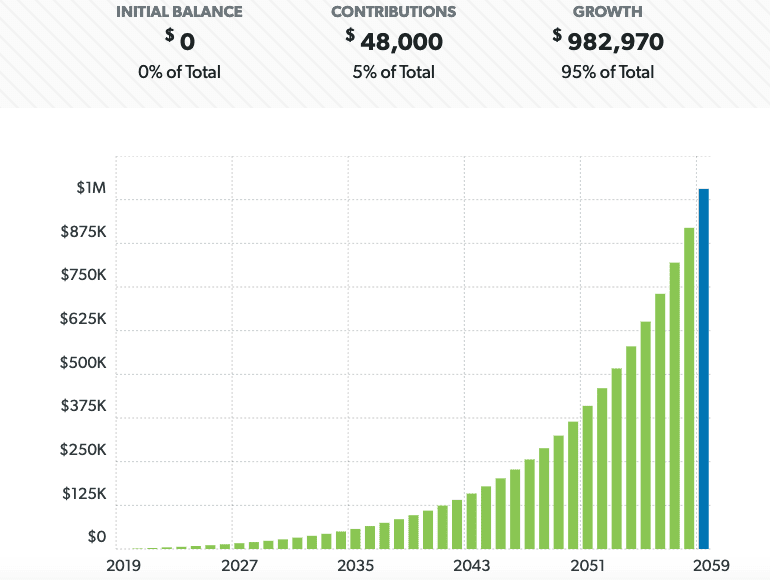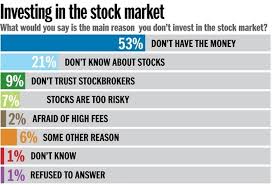
Although we know that the stock market goes up in the long-term, more than half of us don’t invest in the stock market. In fact, there is not a single ten-year period in the history of the stock market where the market did not increase.
With such a tried and true method for building wealth, why have so many Americans missed out on a 2+ year bull market? Let’s look at the top reasons reported by a Bankrate Money Pulse survey.

Six Sigma tells us to use a Pareto Chart like this to focus on the vital few as opposed to the trivial many. This makes the biggest impact with the least effort. According the Bankrate’s survey, lack of money, lack of knowledge, and lack of trust account for 83% of the reasons, so let’s begin there.
1. Lack of Money (53%)
About 53% of people surveyed say that lack of money was the main reason they do not invest in the market. Oh what a wonderful opportunity for growth! There are three main areas to examine.
- dumping debt
- reduce expenses
- increase income
Dumping debt
This is the most common reason for lack of money to invest. Money going out the door to MasterCard and Visa can’t be used for investing. The top priority for accumulating wealth is dumping consumer debt — the “bad” debt.
Consumer debt carries with it the highest rates. And the typical debtor has used the consumer debt for non-essentials. That is, they are charging for stuff that is not food (groceries), shelter (rent and utilities), clothing, and transportation. Buying an Xbox on credit and paying the minimum more than doubles the cost of that item.
After consumer debt is wiped clean with the Debt Snowball and a side hustle, most people find that they have more than enough to invest with.
Reduce expenses
Once debt is dumped, the simpler thing to do is to focus on lowering expenses. Simple is not the same as easy. Lack of money is sometimes an excuse for lack of priorities, and people can get defensive in the justification of their spending.
I challenge people to track spending for a month. They usually discover a pattern of spending more money than they realize on dining out. If this is a luxury they’re not willing to moderate in order to invest, then we look at ways to increase income. But it is simpler to modify spending behaviors, then embark on a new career, or trading more time for money.
Increase income
Maybe you are maximally employed. If that’s the case, increasing income may require more schooling or earning of certifications. But this may also cause an increase in consumer debt. Sometimes having a part-time hustle is the solution, but that typically ends after the Debt Snowball is complete.
For example, I am a veteran teacher at the top of my District’s pay scale. To make more money, I may need to learn new skills to become an administrator. Or I could get a side hustle.
Working nights at Lowe’s was a great short-term solution during the Debt Snowball. But it’s tough to sustain beyond that. Many of us are exploring non-traditional alternatives. Starting a YouTube channel, retailing on Amazon, writing Kindle ebooks, creating an Ebay store, etc. In the 21st century, there are more ways to earn money than ever.
2. Lack of Knowledge (21%)
About 21% of those surveyed say lack of knowledge is why they do not invest. The reason for a lack of knowledge is sometimes a lack of ambition, but more likely a lack of confidence. People don’t like asking what they feel are “dumb” questions. They mistakenly assume that everyone but them knows about stocks and how to invest.
Finding an investment professional with the heart of a teacher can be helpful. But more and more people are using financial coaches like me. Financial coaches fill a niche for beginners who are just thinking about tipping their toe in the water. And someone with the heart of a teacher is more than glad to listen to you, provide information, and inject hope.
Besides, with platforms like Robinhood and M1 Finance, there is no need to pay commissions for trading these days. Inside your Vanguard Roth IRA, you can even invest in low-cost Vanguard ETFs for free.
Bottom line, find someone who is looking out for you, not someone trying to sell you their products and collecting commissions.
3. Lack of Trust (9%)
This ties in with lack of knowledge, and leads into the belief that the stock market is risky. The reason people don’t ask questions might be because they have encountered investment professionals who lack this “heart of a teacher” I’m talking about. They use big “Charlie Brown” words. Some may even speak condescendingly toward potential clients. I was in a presentation where the investment guy talked down to us so badly that it was offensive.
So the lack of trust rounds out the top 80% of reason people aren’t investing in the stock market. Unfortunately, this is mostly out of your control. If you’re new, it isn’t your job to straighten out the bad apples. Just be aware that they exist, and be willing to move on to the next
My 2 Cents

I was surprised that only 7% said that high risk was a factor. This would have been next on the list, taking us up to 90%. So in terms of a Pareto analysis, it isn’t as meaningful as I thought it would be.
Still, people should be aware that investing in individual stocks may carry a fair amount company-specific risk. However, ETFs are my favorite, because they experience far less variability. This is due to diversification, or the holding of more stocks in the fund. In either case, investing in the market is far less risky than gambling. Don’t be afraid. Start small, and build up your confidence. Soon, you’ll be an old pro.
What are your thoughts?